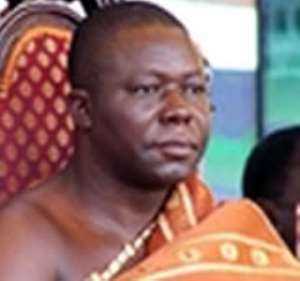
The Asantehene, Otumfuo Osei Tutu II, says Ghana can serve as a model for the World Bank in identifying missing links to solving problems in agricultural development in Africa.
He observes the country has the requisite human resource capacity, adding what is left is how to harmonize and coordinate agricultural projects to achieve the desired objectives.
Ghana's Executive Director at the World Bank, Javed Talet, who was at the Manhyia Palace on a courtesy call, emphasized agricultural productivity and population control as critical areas of attention by Ghana.
Otumfuo however raises questions about the slow pace of the country's agricultural development.
Impediments to agricultural growth, as observed by the Asantehene include, lack of political will “because Politicians in Africa generally maybe look at it that when they have four years to go back to campaign, they want issues that people will see, more than going into agriculture where you cannot see to use as the basis for campaigning”, budgetary constraints to develop road and other infrastructure to propel people to go to the rural areas to farm and “the methods of agriculture, in terms of peasant farming instead of mechanical farming, is also another area that doesn't enhance growth in agriculture”.
Land tenure is also as a challenge and Otumfuo Osei Tutu said as he entreated chiefs to be engaged in equity participation instead of selling lands, whilst streamlining land acquisition to enhance progress and development.
“Ghana, notwithstanding the oil and gold, is an agrarian economy and agriculture will be, is and should be the main stay of the economy. If we do not look at agriculture seriously, then the economy still wouldn't grow”, stated the Asantehene.
Mr. Talet is on a one-week visit to Ghana for discussions with government on the World Bank's strategic areas of collaboration over the next three years.
The Bank is looking at ways to strengthen investments in infrastructure, agriculture and local governance.
The Otumfuo believes decentralization of World Bank projects would endear majority of Ghanaians, especially rural communities to feel the impact of the funding institution.
Manhyia has been involved in World Bank assisted projects in health and education.
The Asantehene called for expansion of partnerships with the traditional authority due to the recorded impact on school enrolment and provision of other facilities like teachers' accommodation, water and electricity.
Story by Kofi Adu Domfeh/Luv Fm/Ghana




 MASLOC former boss sentenced to 10 years in prison with hard labour
MASLOC former boss sentenced to 10 years in prison with hard labour
 Convert National Cathedral site to tourist centre — Spio-Garbrah to govt
Convert National Cathedral site to tourist centre — Spio-Garbrah to govt
 2024 election: Don’t be scared; we're ready to maintain law and order – Dampare ...
2024 election: Don’t be scared; we're ready to maintain law and order – Dampare ...
 NDC to officially outdoor Prof Jane Naana as 2024 running mate on April 24
NDC to officially outdoor Prof Jane Naana as 2024 running mate on April 24
 ECG board members slapped GHS5.8 million fine by PURC for failing to alert publi...
ECG board members slapped GHS5.8 million fine by PURC for failing to alert publi...
 I never left NPP, they 'sacked' me for attending Alan's programme; even a $100mi...
I never left NPP, they 'sacked' me for attending Alan's programme; even a $100mi...
 Fuel prices go up today
Fuel prices go up today
 Anti-gay bill: Your stance serves no purpose; either you actively advocate for t...
Anti-gay bill: Your stance serves no purpose; either you actively advocate for t...
 Tension brews as NPP Seattle clashes with national leadership over parallel chap...
Tension brews as NPP Seattle clashes with national leadership over parallel chap...
 Anti-gay bill: You've done nothing in Ghana to prove you're against LGBTQ+; ther...
Anti-gay bill: You've done nothing in Ghana to prove you're against LGBTQ+; ther...
